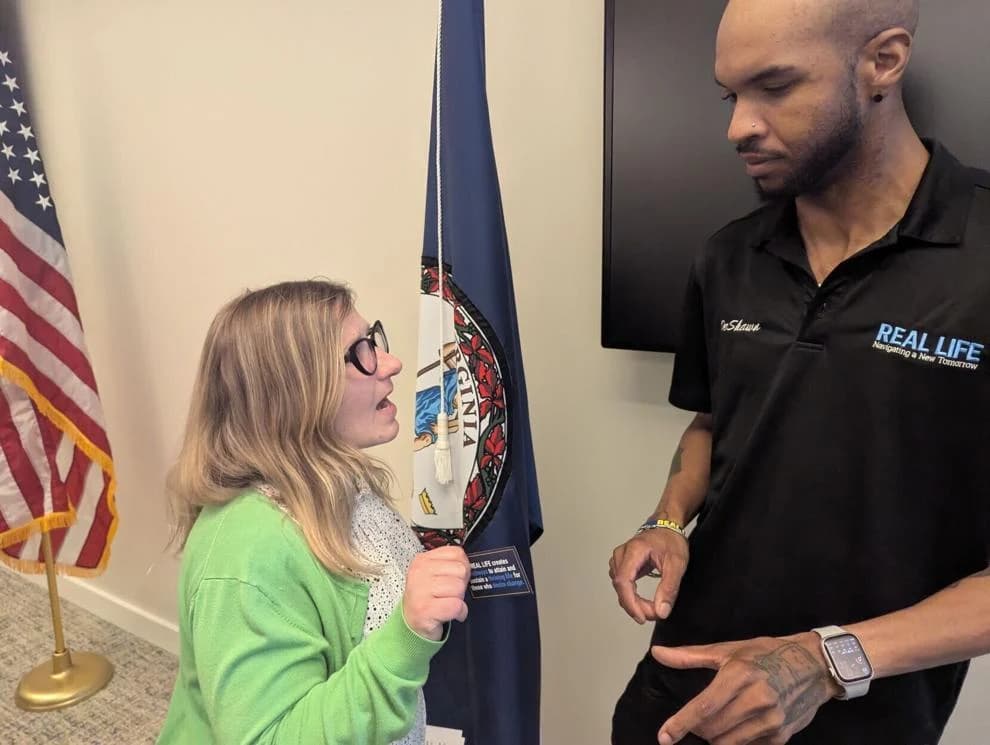RICHMOND — As Republican members of Congress focus more on what Washington pays to support expanded Medicaid coverage, Jessi Ross, thinking of her path to recovery from addiction, is growing alarmed.
“I’m not even sure if I would be alive if it were not for Medicaid,” Ross said Wednesday at a news conference at the General Assembly Building where she and others called on Virginia’s congressional delegation not to cut Medicaid funding.
She said she had been addicted to opioids for more than 20 years, living out of state, and when her partner died of an overdose a few years back, her mom brought her back home to Virginia.
In 2018 Virginia lawmakers and Gov. Ralph Northam approved Medicaid expansion, choosing to accept Affordable Care Act funds to provide Medicaid coverage to more people. Before that, Virginia had some of the most limited coverage in the nation.
Virginia’s Medicaid expansion, which covers some 630,000 people now, is at risk. Even the smallest cut in what the federal government pays as its share of the expansion — 90% as opposed to 50% for traditional Medicaid — would trigger an automatic cancelation of coverage for those 630,000 people, including Ross.
Virginia’s Medicaid expansion included a “kill switch” to reverse the expansion if the federal government reduced its share of the costs by more than 1%.
This week, Rep. Austin Scott, R-Ga., told Fox Business that Republicans are thinking of cutting much of their $880 billion target for Medicaid by cutting the amount Washington pays for Medicaid expansion.
When Ross thinks of what that could mean, she remembers that Medicaid paid for an intensive outpatient treatment program — eight hours a day, three days a week — as well as group therapy.
“My case manager, who was paid by Medicaid, literally just put me on my feet and sober … Medicaid also paid for my suboxone when I relapsed,” she said, “Without Medicaid, suboxone and doctors’ appointments would have been unaffordable.”
Ross said that on the way to getting better, she learned that she had undiagnosed bipolar disorder and panic disorder.
“Just my mental health medications would cost me $80 a month when I didn’t even have shoes," she said.
"Medicaid gave me basic stability in terms of affording my medicine and my treatment, as well as my outpatient treatment.”
“So I’m here just to beg Congress, please do not cut Medicaid…. People will relapse. I’m afraid I will relapse without the health care I get to Medicaid,” she said.
She said she’s learned she can live a sober, productive life — Ross now works as a peer recovery specialist, helping others along the path she’s been following.
“But you need supports to do it, and when you start removing those supports, the world collapses around you, and you could relapse. Medicaid saved my life,” she said.
State Sen. Ghazala Hashmi, D-Chesterfield echoed the call to Virginia’s congressional delegation — especially Rep. Rob Wittman, R-1st, and Rep. Jen Kiggans, R-2nd. They recently signed a letter saying they will not support the budget bill that House Republicans are preparing to carry out President Donald Trump’s political agenda if it cuts health care coverage that vulnerable Virginians receive under Medicaid.
“I see it very much as a performative gesture. And I hope that it is more than that," said Hashmi, one of six Democrats seeking the party’s nomination for lieutenant governor in a June 17 primary. “I hope they’re going to actually follow up with real, meaningful action.”
The impact on Virginia if expansion funding is cut and so many Virginians are cut from Medicaid rolls would be catastrophic, she said.
Medicaid, thanks to the expansion, pays for the anxiety medication that DeShawn Cross needs, just as it paid for a detox program and the medication he needed when withdrawal triggered seizures.
“I was addicted to alcohol and living on the streets of Newport News and Norfolk at first, but thanks to Medicaid, I was able to get to a recovery program in the area,” he said.
“Medicaid also covered my first 30 days of my recovery … and it was thanks to my case manager there, who was paid by Medicaid, that I was able to get into a recovery house program,” he said.
“I would just tell members of Congress, if you want to get more people to be productive members of society, some of them need help getting a start. I needed that help getting a start, and Medicaid was that start,” he said.
“You can’t take something away from somebody who is trying to find their way. If you take that away, what are they going to start with?
"Where are they going to go? What are they going to do?”

